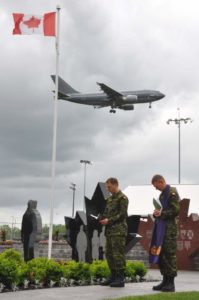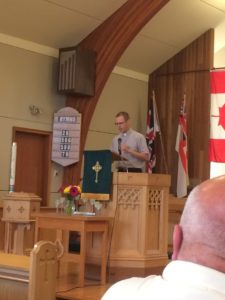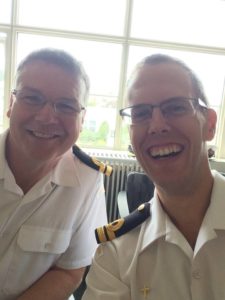What exactly does a military chaplain do? Well, I can’t speak for all of them but at General Conference, I did have the chance to sit down with Andrew Klinger and learn a little about what he does. Andrew is an ordained Free Methodist pastor and military chaplain with the Canadian Armed Forces currently stationed at CFB Esquimalt, a naval base in British Columbia.
“I felt the call of God towards ministry since about grade 8. When I went to Lutheran Seminary the differences in theology between mine and theirs showed a need to engage another tradition. My wife and I spent a summer reading all the positional papers of all the denominations across Canada and by the end of the summer we both agreed on Free Methodist Church in Canada as our first choice. I then entered the FM church and went through the whole ministerial process.”

Around the time Andrew decided to finish his Masters of Divinity, he met Canadian Armed Forces chaplain Michael Allen who planted the idea of military chaplaincy. “I registered to finish my MDiv and moved Nepean, ON and under the care of Mike Hogeboom and Lynda Sinclair, I worked with youth for two years at Arlington Woods. In December 2013 I graduated with MDiv from Wycliffe College at the Toronto School of Theology and was ordained with the FMCiC. I then applied to the Canadian Armed Forces and in April 2014 I started basic training in Ottawa, ON.
“For the first two years you wear the faith identifiers (in our case, a cross above our name tape) but your main job is to learn what it means to be an officer in the armed forces, about the command structure, justice/law, how to be a good leader and undergo French training. You also complete chaplaincy specific training which includes pastoral counselling, ethics and the basics of chaplaincy.”
At CFB Esquimalt there are approximately 4000-6000 men and women on base and 10 military chaplains. Each chaplain can be assigned a number of units and ships, which can range from 50 people to as much as 2000 or more depending on the function and structure of the unit. As a chaplain you are present and available to your men and women 24 hours a day.
So what does a day in the life of a military chaplain look like? “The chaplaincy branch we minister to our own, we facilitate the worship of others and we care for all.”
Minister, facilitate and care. I asked Andrew for some specifics. “A day might start with a member of any rank coming to see me. The chaplain traditionally becomes the same rank (+ 1 day) as the member who enters the room. If I have a corporal who has been around 3 years then I’m a corporal 3 years + 1 day. If a brigadier general enters my office then I’m a brigadier general +1 day. The chaplain’s office is a space like no other in the military. It is the only space where a member can vent and talk about family, mental health concerns or anything they want to speak about in confidence.”

Andrew takes the information shared and, with the permission of the member, speaks with whomever is necessary up and down the chain of command to assist the member. “a primary concern of the chaplain is to be a force multiplier to our troops, sailors, and air-personnel. That is, to ensure our members are fully engaged and mindful of their role in the CAF. You can’t fully do that unless the things at home, aspects of mental health, care of your children, and so on are being taken care of while you are serving.”
So a day might include compiling a report requesting compassionate leave for a visit to a dying parent, advising the chain of command on matters of care for their members, helping a member find funding for her children’s summer camp or checking in with family while a member is at sea.
Andrew is also the base Faith community coordinator. “Chapel here is unlike anything else. We have a vast array of denominational groups. Currently we have Pentecostal,Evangelical Free, Baptist, Lutheran and Anglican ministers represented here in Esquimalt. The neat thing is you get a wonderful variety of preaching styles and approach to theology and ministry. One of our core values is not to proselytize anyone. What we speak from the pulpit is strictly in our tradition, with the loose parameters of a divine order of service (often liturgical in nature) so that the congregants feel comfortable week to week, even with different denominational representation at the front. My job is to coordinate everyone to make sure that our members are taken care of.”
“It’s a strange thing to manoeuver as a Free Methodist in that space but it is also a joy because there is a depth of Christianity that you may not get being in the same church every single week. As the team is posted in and out you get this neat conglomerate of chaplains who care about people in the congregation deeply and because we share being in the armed forces and protecting the interest of Canada, the conversations and sermons take on a flavour unique to our own.”

I asked Andrew what the most rewarding part of his job is, “Imagine being the pastor of a congregation and the congregation is within 40-50 paces of your office at all times. You get to be present to these people all the time, both domestically and abroad, and especially so when on a ship at sea. You get face time a lot and that’s important because you learn about their day to day and then they view you as approachable. Then if things get difficult and you already have a rapport with you so it’s not so difficult.”
There was one other perk to Andrew’s job that I thought was pretty cool, “As part of a military, I do get to ride in helicopters and sail on ships – an experience like no other.”



